19 June 2022
Small steelmakers cheer input cost cut as big rivals fret over export duty

It’s a tale of contrasting fortunes in the Indian steel industry since last month’s revision of import and export duties on key raw materials and finished goods.
Smaller steelmakers benefited from the duty changes as their costs went down and they had little adverse impact on their business, while large steelmakers’ export business nosedived as duty revisions made Indian steel uncompetitive on the global stage.
Some small companies even published newspaper advertisements to thank the Centre for its decision.
“Small are much happier now because there is good demand from rural areas due to price decrease,” said Vijay Jhanwar, an industrialist operating five secondary steel manufacturing units in Chhattisgarh.
The government levied a 15% duty on the export of most of the key categories of steel in a bid to bring down prices in the domestic market and thus rein in inflation. An even higher duty of 45-50% was levied on different grades of iron ore, a key raw material, to discourage export and increase supply in the domestic market. A 2.5-5% duty on the import of different varieties of coal was removed for the same reason.
Prices of steel have been on a decline since April after hitting an all-time high of Rs 78,800 per tonne for benchmark hot-rolled coil (HRC) steel, according to data from SteelMint, a market intelligence firm. Price of HRC steel was Rs 61,400 a tonne as of June 15, SteelMint data show.
Receding domestic demand ahead of monsoon, a decline in input costs, and lower exports since the levy of export duty all attributed to the fall in steel prices.
Lower input costs also mean that liquidity issues of smaller players get resolved to an extent, Jhanwar said. “If the government continues to maintain such duty policies, then secondary steel producers would rather make more capital investments to create new capacities as the cost of setting up new capacity also has decreased,” he said.
Meanwhile, larger steel companies rue that they have to either absorb the export duties and incur a loss on exports, or lose their international customers cultivated over several years to global rivals.
“Inflation should come down, but steel export was not the reason for it,” a senior executive at a leading steelmaker told ET on the condition of anonymity. “The industry has never exported steel at the expense of the domestic market.”
This executive argued that the increase in prices of steel in the domestic market over the past year was in tandem with the price of raw materials and international steel and not in isolation. Thus, the solution was to bring down input costs and not stop exports, the person said.
Larger steelmakers further argue that they had planned capacity expansion based on export demand projection and now they may have to reconsider their capital investment plans.
“This will put the industry behind by 10 years,” the executive quoted above said.
Hetal Gandhi, director at Crisil mark NSE -0.44 %
Research, said the duty revision has impacted larger and smaller steelmakers differently. “The smaller players were anyway not exporting, so the export duty has no bearing on them. They will benefit as input cost goes down,” she said. For larger steelmakers, profitability will take a hit given the impact on the high-margin exports business, Gandhi added.
Source: https://economictimes.indiatimes.com/industry/indl-goods/svs/steel/small-steelmakers-cheer-input-cost-cut-as-big-rivals-fret-over-export-duty/articleshow/92322086.cms